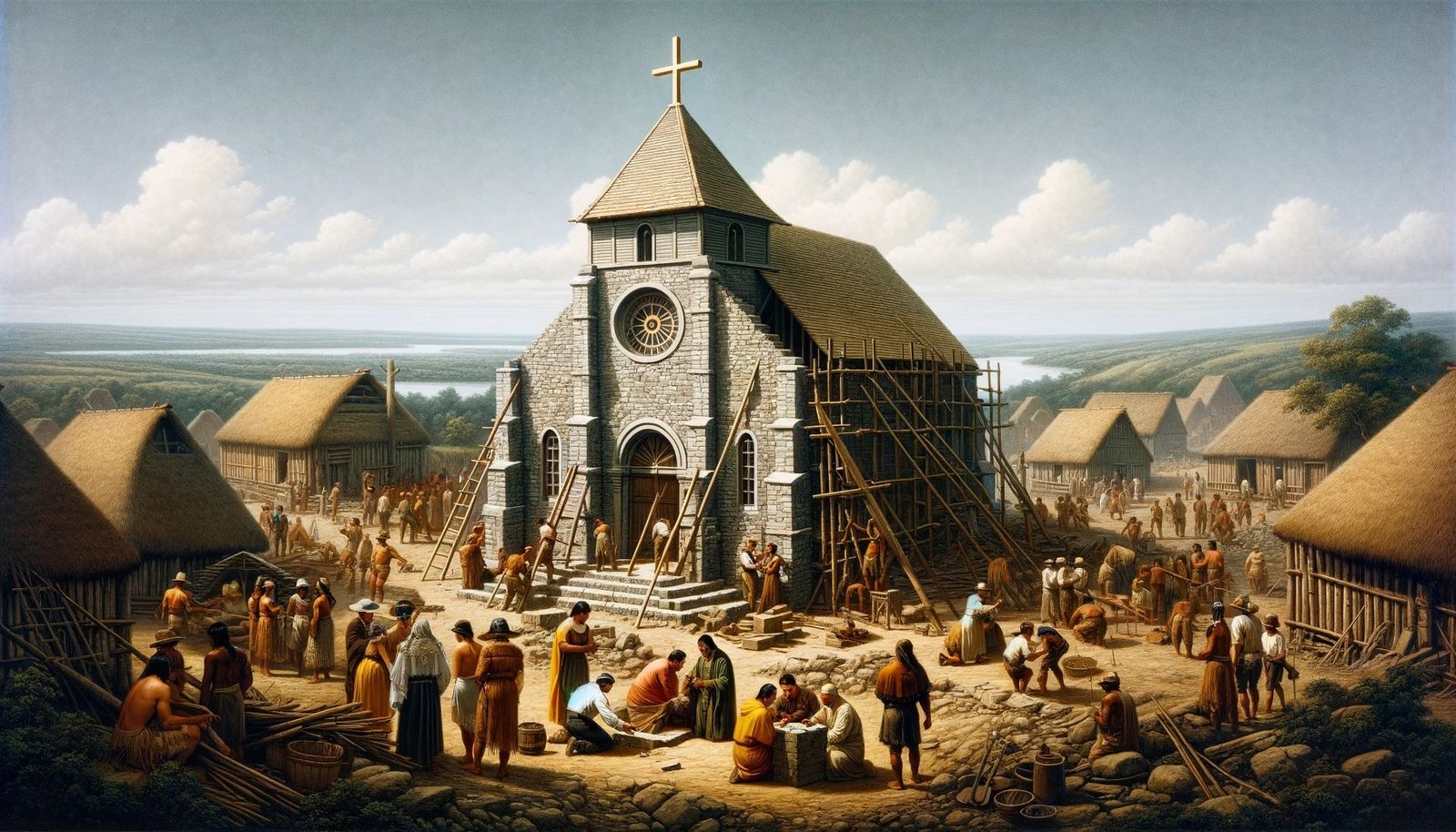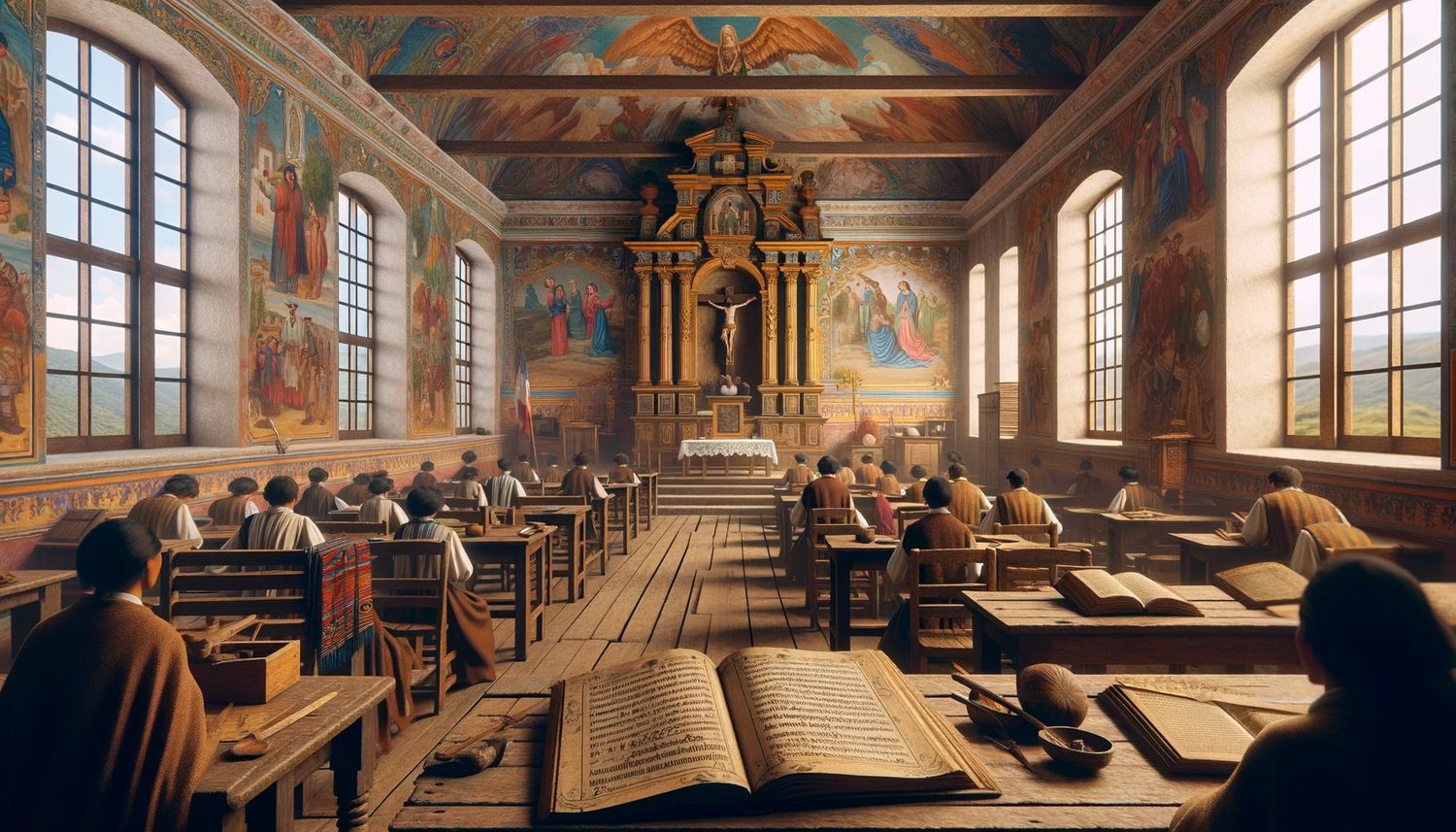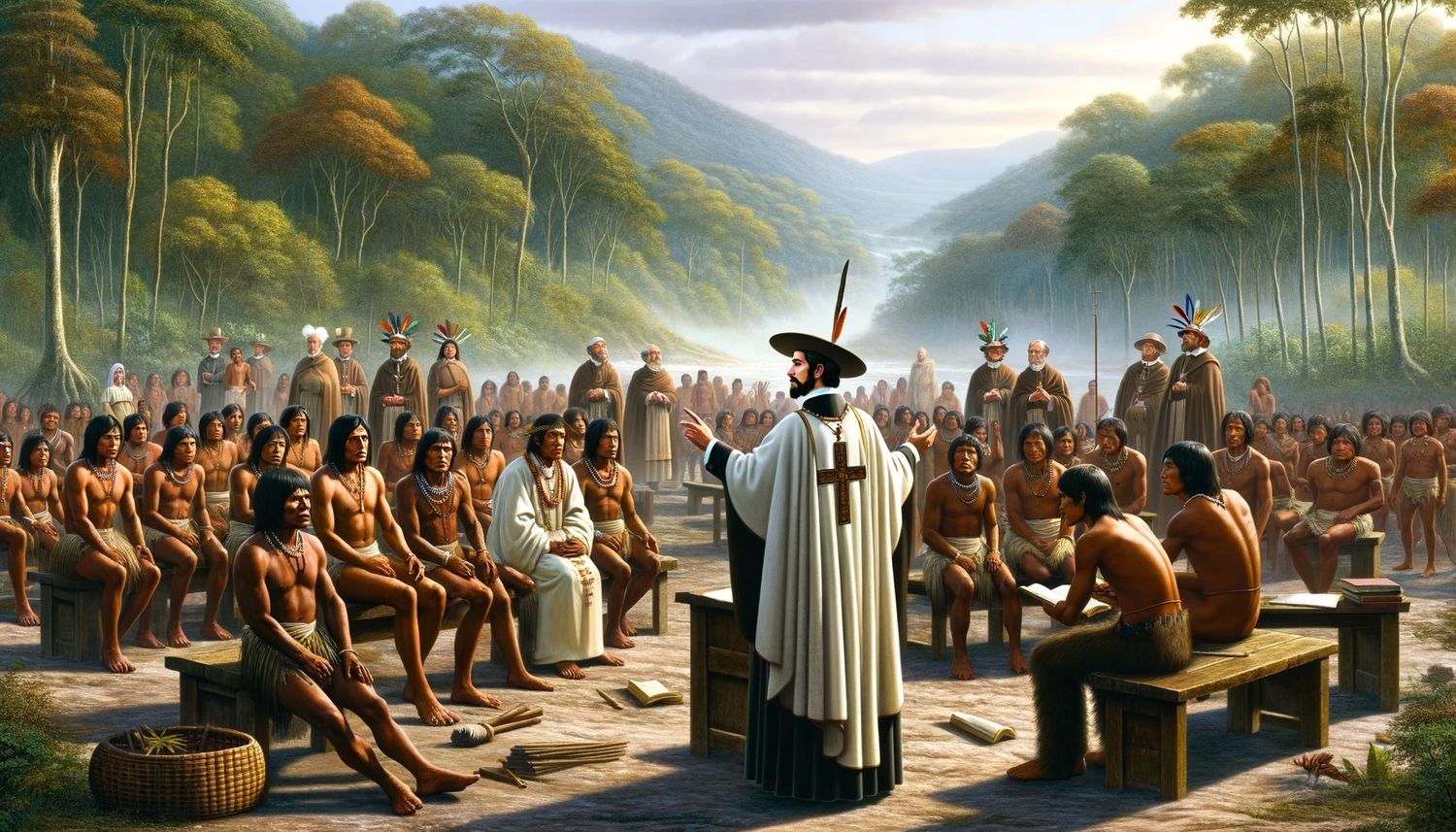Home>Theology and Spirituality>How Did The Jesuits Help Strengthen Catholicism In Europe?


Theology and Spirituality
How Did The Jesuits Help Strengthen Catholicism In Europe?
Published: February 17, 2024
Jason DeRose, Managing Editor at Christian.net, uses his expertise in religion and journalism to deepen understanding of faith's societal impacts. His editorial leadership, coupled with a strong academic background, enriches the platform’s diverse content, earning him recognition in both journalism and religious circles.
Discover how the Jesuits played a pivotal role in advancing Catholicism in Europe through their theological and spiritual influence. Explore their impact on the faith.
(Many of the links in this article redirect to a specific reviewed product. Your purchase of these products through affiliate links helps to generate commission for Christian.net, at no extra cost. Learn more)
Table of Contents
Introduction
The Jesuits, also known as the Society of Jesus, played a pivotal role in strengthening Catholicism in Europe during a time of significant religious and political upheaval. Founded by St. Ignatius of Loyola in 1540, the Jesuit order quickly became a formidable force within the Catholic Church, employing a combination of education, missionary work, and political influence to advance the Catholic faith.
During the 16th and 17th centuries, Europe was embroiled in the Protestant Reformation, a movement that challenged the authority of the Catholic Church and led to the splintering of Christianity into various denominations. In response to this challenge, the Jesuits emerged as a vanguard of the Catholic faith, employing their unique blend of spirituality, intellect, and discipline to combat the spread of Protestantism and reinvigorate Catholicism across the continent.
As we delve into the multifaceted contributions of the Jesuits, it becomes evident that their impact extended far beyond the confines of traditional religious institutions. The Jesuits' influence permeated the realms of education, missionary work, counter-reformation efforts, and European politics, leaving an indelible mark on the fabric of European society.
In the subsequent sections, we will explore the establishment of the Jesuit order, their pivotal role in education, their missionary endeavors, their involvement in the Counter-Reformation, and their influence on European politics. Through this exploration, we will gain a comprehensive understanding of how the Jesuits navigated the complex landscape of 16th and 17th century Europe, leaving an enduring legacy that continues to shape the course of Catholicism and European history.
The Establishment of the Jesuit Order
The Jesuit order, formally known as the Society of Jesus, was founded by St. Ignatius of Loyola and officially recognized by Pope Paul III in 1540. St. Ignatius, a Spanish nobleman and former soldier, underwent a profound spiritual transformation after being wounded in battle. During his recovery, he immersed himself in religious texts and embarked on a spiritual journey that ultimately led to the formation of the Society of Jesus.
The Jesuits were characterized by their unwavering loyalty to the Pope and their commitment to serving the Catholic Church. St. Ignatius outlined the order's mission in his famous Spiritual Exercises, emphasizing the pursuit of "the greater glory of God" through rigorous spiritual discipline, education, and missionary work. This foundational ethos propelled the Jesuits into a position of prominence within the Catholic Church and European society.
One of the defining features of the Jesuit order was its emphasis on education. St. Ignatius recognized the power of knowledge in shaping hearts and minds, and he envisioned the Jesuits as educators who would mold future generations of Catholics. To this end, the Jesuits established numerous schools and universities across Europe, offering a rigorous curriculum that combined academic excellence with spiritual formation. This focus on education became a cornerstone of the Jesuit identity and a key instrument in advancing Catholicism in Europe.
Furthermore, the Jesuits' organizational structure set them apart within the Catholic Church. The order was characterized by its centralized authority, with the Superior General wielding significant influence over the activities of individual Jesuits. This hierarchical structure facilitated the rapid expansion of the Jesuit order and enabled them to respond effectively to the challenges posed by the Protestant Reformation.
In essence, the establishment of the Jesuit order marked a significant turning point in the history of the Catholic Church. Through their unwavering commitment to education, spirituality, and obedience to the Pope, the Jesuits emerged as a formidable force dedicated to upholding and strengthening Catholicism in Europe. This foundation laid the groundwork for the multifaceted contributions that the Jesuits would make in the realms of education, missionary work, counter-reformation efforts, and European politics.
The Jesuits' Role in Education
The Jesuits' commitment to education was a cornerstone of their mission to strengthen Catholicism in Europe. St. Ignatius of Loyola, the founder of the Society of Jesus, recognized the transformative power of knowledge and sought to harness it in service of the Catholic faith. Consequently, the Jesuits established a vast network of schools and universities across Europe, offering a comprehensive education that combined academic rigor with spiritual formation.
At the heart of Jesuit education was the concept of "cura personalis," or care for the individual. This holistic approach to education aimed to nurture the intellectual, spiritual, and moral development of students. The Jesuits believed that a well-rounded education was essential for cultivating devout and informed Catholics who could effectively defend and propagate the teachings of the Church.
The curriculum in Jesuit schools encompassed a wide range of subjects, including classical languages, literature, philosophy, theology, and the sciences. This broad-based education was designed to instill critical thinking, eloquence, and a deep understanding of Catholic doctrine. Moreover, the Jesuits emphasized the pursuit of excellence in all academic disciplines, fostering a culture of intellectual rigor and scholarly achievement.
Beyond academic pursuits, the Jesuits placed a strong emphasis on character formation and moral guidance. Students were encouraged to develop virtues such as humility, compassion, and a sense of social responsibility. The Jesuits believed that cultivating virtuous individuals was essential for building a society grounded in Catholic values and principles.
Furthermore, the Jesuits' educational endeavors extended beyond traditional classroom settings. They utilized innovative teaching methods, such as practical demonstrations and experiential learning, to engage students and make learning more accessible. Additionally, the Jesuits' commitment to education extended to marginalized communities, as they established schools for the poor and marginalized, providing educational opportunities to those who were often overlooked by society.
In essence, the Jesuits' role in education was instrumental in fortifying Catholicism in Europe. Their holistic approach to education, emphasis on academic excellence, and commitment to character formation left an indelible mark on generations of students. Through their educational initiatives, the Jesuits not only imparted knowledge but also instilled a deep sense of devotion to the Catholic faith, shaping the intellectual and spiritual landscape of Europe for centuries to come.
The Jesuits' Role in Missionary Work
The Jesuits' commitment to missionary work was a cornerstone of their efforts to strengthen Catholicism in Europe and beyond. From the early days of the Society of Jesus, St. Ignatius of Loyola envisioned a global mission to spread the Catholic faith to distant lands and engage with diverse cultures. This vision propelled the Jesuits into the vanguard of missionary endeavors, leading to their significant impact on the expansion of Catholicism across the world.
One of the most notable aspects of the Jesuits' missionary work was their willingness to immerse themselves in unfamiliar territories and engage with indigenous populations. Unlike many other missionary orders of the time, the Jesuits adopted a respectful and adaptive approach to evangelization, seeking to understand and integrate local customs and traditions into their missionary efforts. This cultural sensitivity allowed the Jesuits to establish meaningful connections with indigenous peoples and facilitated the spread of Catholicism in regions as diverse as Asia, Africa, and the Americas.
The Jesuits' missionary zeal was exemplified by their commitment to learning local languages and customs, often producing dictionaries and grammars of indigenous languages to aid in their evangelization efforts. This dedication to linguistic and cultural adaptation enabled the Jesuits to communicate the teachings of Catholicism in ways that resonated with the local populations, fostering a deeper understanding and acceptance of the faith.
Moreover, the Jesuits' missionary work extended beyond traditional evangelization, encompassing a wide range of social and humanitarian initiatives. They established schools, hospitals, and orphanages in the regions where they worked, providing vital services to local communities and earning the trust and respect of the people they served. This holistic approach to missionary work not only contributed to the spread of Catholicism but also improved the quality of life for countless individuals in the areas where the Jesuits were active.
The Jesuits' missionary endeavors were characterized by their adaptability, resilience, and unwavering commitment to sharing the Catholic faith with diverse cultures and societies. Their approach to missionary work, marked by cultural sensitivity and a holistic view of evangelization, left a lasting legacy that continues to shape the global presence of Catholicism. Through their missionary efforts, the Jesuits played a pivotal role in expanding the reach of the Catholic Church and fostering a spirit of global unity within the faith.
The Jesuits' Role in Counter-Reformation
The Jesuits played a significant role in the Counter-Reformation, a period of Catholic resurgence and response to the challenges posed by the Protestant Reformation. As the Protestant movement gained momentum across Europe, the Catholic Church recognized the need for internal reform and revitalization. The Jesuits emerged as a vanguard of this reform effort, employing their unique blend of spirituality, intellect, and organizational prowess to combat the spread of Protestantism and revitalize Catholicism.
One of the key contributions of the Jesuits to the Counter-Reformation was their unwavering commitment to defending and propagating the teachings of the Catholic Church. They engaged in rigorous theological debates, produced influential writings, and delivered compelling sermons aimed at reaffirming the core tenets of Catholic doctrine. Through their intellectual rigor and persuasive rhetoric, the Jesuits effectively countered the theological challenges posed by the Protestant Reformation, bolstering the Catholic faith and inspiring a renewed sense of devotion among the faithful.
Furthermore, the Jesuits played a pivotal role in spearheading spiritual renewal within the Catholic Church. They emphasized the importance of personal piety, devotion to the sacraments, and adherence to traditional Catholic practices. Through their spiritual guidance and pastoral care, the Jesuits revitalized the spiritual fervor of the Catholic faithful, fostering a renewed sense of religious identity and commitment to the Church.
The Jesuits also contributed to the Counter-Reformation through their active involvement in the Council of Trent, a landmark ecumenical council that addressed the doctrinal and disciplinary issues raised by the Protestant Reformation. Several prominent Jesuit theologians and scholars participated in the council, advocating for doctrinal clarity, ecclesiastical reform, and the reaffirmation of Catholic teachings. Their contributions were instrumental in shaping the decrees and canons of the Council of Trent, which laid the foundation for the Catholic Church's response to the challenges of the Reformation.
In essence, the Jesuits' role in the Counter-Reformation was characterized by their intellectual prowess, spiritual fervor, and unwavering commitment to upholding and strengthening the Catholic faith. Their multifaceted contributions, spanning theological debates, spiritual renewal, and active participation in ecumenical councils, positioned the Jesuits as influential agents of reform within the Catholic Church. The impact of their efforts reverberated across Europe, contributing to the revitalization of Catholicism and shaping the course of the Counter-Reformation.
The Jesuits' Influence on European Politics
The Jesuits wielded significant influence on European politics during the 16th and 17th centuries, leveraging their intellectual, diplomatic, and spiritual acumen to shape the political landscape of the era. As a formidable force within the Catholic Church, the Jesuits cultivated close ties with monarchs, nobility, and influential figures across Europe, positioning themselves as trusted advisors and influential power brokers.
One of the primary avenues through which the Jesuits exerted their influence on European politics was through their role as advisors to monarchs and rulers. Recognized for their erudition and sagacity, Jesuit scholars and theologians were often sought after for counsel on matters of statecraft, diplomacy, and governance. Their expertise in theology, philosophy, and law made them invaluable assets to European rulers, who relied on their guidance in navigating complex political and religious challenges.
Moreover, the Jesuits' influence extended to the realm of international diplomacy, where they played a pivotal role in mediating conflicts and fostering alliances between European powers. Their diplomatic missions often involved brokering peace agreements, negotiating treaties, and mitigating tensions between rival factions. The Jesuits' reputation for impartiality, integrity, and astute diplomacy earned them the trust of European leaders, enabling them to shape the course of international relations and geopolitical dynamics.
Furthermore, the Jesuits' impact on European politics was evident in their efforts to promote Catholic interests and combat the spread of Protestantism. Through their extensive network of schools, universities, and seminaries, the Jesuits cultivated a cadre of loyal and devout Catholics who were poised to assume positions of influence within political and ecclesiastical spheres. This strategic investment in education enabled the Jesuits to shape the ideological orientation of future leaders, ensuring a steadfast commitment to Catholic principles within the corridors of power.
Additionally, the Jesuits' involvement in the Counter-Reformation and their unwavering defense of Catholic doctrine had profound implications for European politics. By staunchly upholding the authority of the Catholic Church and advocating for doctrinal orthodoxy, the Jesuits influenced the policies and decisions of European rulers, who often aligned their governance with the tenets of Catholicism espoused by the Society of Jesus.
In essence, the Jesuits' influence on European politics was multifaceted, encompassing advisory roles, diplomatic mediation, educational influence, and ideological shaping. Their impact reverberated across the political landscape of Europe, contributing to the preservation and advancement of Catholic interests and principles during a tumultuous period of religious and political upheaval.
Conclusion
In conclusion, the Jesuits, or the Society of Jesus, played a pivotal role in strengthening Catholicism in Europe during a time of profound religious and political transformation. From their establishment by St. Ignatius of Loyola in 1540, the Jesuits emerged as a formidable force within the Catholic Church, employing a multifaceted approach to advance the Catholic faith. Their contributions in education, missionary work, the Counter-Reformation, and European politics left an indelible mark on the fabric of European society and the global presence of Catholicism.
The Jesuits' commitment to education was instrumental in shaping the intellectual and spiritual landscape of Europe. Through their network of schools and universities, they imparted a comprehensive education that combined academic rigor with spiritual formation, nurturing generations of devout Catholics who would become influential leaders and thinkers. Their emphasis on character formation and moral guidance fostered a culture of intellectual excellence and moral integrity, leaving a lasting legacy in the realm of education.
Furthermore, the Jesuits' missionary endeavors extended the reach of Catholicism to distant lands and diverse cultures, characterized by their cultural sensitivity and holistic approach to evangelization. Their commitment to learning local languages and customs, coupled with their establishment of social and humanitarian initiatives, facilitated the spread of Catholicism and improved the lives of countless individuals across the globe.
In the context of the Counter-Reformation, the Jesuits emerged as stalwart defenders of the Catholic faith, engaging in theological debates, spiritual renewal, and active participation in ecumenical councils. Their intellectual prowess and unwavering commitment to upholding Catholic teachings contributed to the revitalization of Catholicism and the reaffirmation of its core doctrines.
Moreover, the Jesuits' influence on European politics was far-reaching, as they leveraged their intellectual, diplomatic, and spiritual acumen to shape the political landscape of the era. Their advisory roles, diplomatic mediation, and strategic investment in education positioned them as influential power brokers, fostering a steadfast commitment to Catholic principles within the corridors of power.
In essence, the Jesuits' multifaceted contributions strengthened Catholicism in Europe and beyond, leaving an enduring legacy that continues to shape the course of Catholicism and European history. Their unwavering commitment to education, missionary work, the Counter-Reformation, and European politics positioned them as influential agents of change, leaving an indelible mark on the global presence of Catholicism and the broader tapestry of human history.














